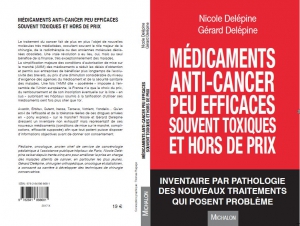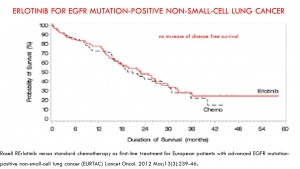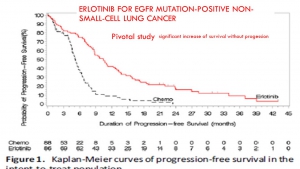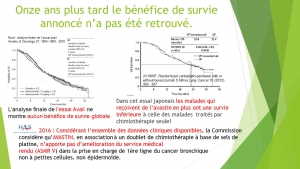Colloque_2017_bobigny-poster-SSP_G_DELEPINE
2017 04 28 COLLOQUE Bobigny survie sans progression
CLIQUEZ SUR LE LIEN CI DESSUS POUR VOIR LE DIAPORAMA PRESENTE A BOBIGNY AU COLLOQUE SUR ET SOUS MEDICALISATION
La durée de survie sans progression est-elle prédictive de la survie globale ? Analyse des études de thérapies ciblées en cancérologie.
Delépine N. Delépine, S Alkhallaf
Introduction. La durée de survie sans progression (SSP) constitue le premier critère de jugement de plus de 90% des essais des thérapies innovantes actuelles lors de la demande d’AMM. Cette SSP est supposée prédictive de la survie globale et donc de l’utilité future pour les malades. Ce travail a pour but de le vérifier ainsi que sa valeur prédictive d’une utilité clinique pour les malades.
Méthode. Une recherche informatisée avec pour mots clefs avastin, herceptin, erbitux, erlotinib, sorafenib, gefitinib, crizotinib, afatinib, temsirolimus, pazotanib, sunitinib, axitinib, dans les cancers broncho-pulmonaires épidermoïdes, du rein, du colon, du sein et ORL a été réalisée. 110 essais ont ensuite ont été examinés pour sélectionner ceux où la SPP et les résultats à long terme ont été publiés précisant la survie globale et la toxicité (51 études). Les gains de durées de survie sans progression publiés lors de l’étude pivot dont été ensuite comparées à ceux de survie globale en recherchant une corrélation statistique par le coefficient de corrélation.
Résultats Les gains de survie sans progression rapportées par les études pivots de thérapies ciblées ne sont pas corrélées avec un gain éventuel de survie globale ni avec un gain éventuel de qualité de vie. Ce résultat confirme de nombreuses macroanalyses dont celles de Petrelli et de l’institut Cochrane (pour TKI et les cancers pulmonaires), et de l’institut Cochrane (pour l’avastin et le cancer du sein),
Conclusions. Lors d’essais de thérapies ciblées en cancérologie , la durée de survie sans progression ne préjuge ni de la durée de survie globale ni d’une balance avantages/risques favorable. Privilégier ce critère pour décerner l’AMM aboutit à exposer les malades à des risques importants et le plus souvent sans bénéfice réel. Il ne devrait donc plus être acceptée comme critère principal.




